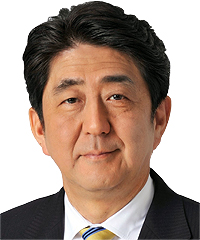DAVOS – For years, pundits called Japan the land of the setting sun. They said that for an economy as mature as Japan’s, growth would be impossible. They said that our public debt was unsustainable. They pointed to our supposed psyche of resignation as a symptom of relative decline.


DAVOS – For years, pundits called Japan the land of the setting sun. They said that for an economy as mature as Japan’s, growth would be impossible. They said that our public debt was unsustainable. They pointed to our supposed psyche of resignation as a symptom of relative decline.
But now such voices are rarely heard. Japan’s economy has swung from negative to positive growth and is on the verge of breaking free from chronic deflation. This spring, wages will increase – a long overdue development that will lead to greater consumption. Our fiscal position has also improved steadily, with my government on track to consolidate public finances.
And, as the economy has turned around, Japan’s people have become more vibrant and upbeat – a mood reflected in public enthusiasm over the choice of Tokyo to host the 2020 Olympic and Paralympic Games.
So it is not twilight, but a new dawn, that is breaking over Japan. And that is because we have overcome the notion that certain reforms could never be carried out. I have maintained that I am willing to act like a drill bit, strong enough to break through the solid rock of vested interests. And so we have.
For example, we will completely liberalize Japan’s electricity market. By the time the Olympians arrive in six years, the power sector will be fully competitive, with electricity generation separated from distribution.
We will also foster medical care as an industry. Japan is on the forefront of regenerative medicine, and we will make it possible to generate stem cells at private-sector labs. And I have just proposed additional reforms, because we also need large-scale health-care providers in the form of holding companies, much like America’s Mayo Clinic.
Moreover, we are eliminating the "rice production adjustment” system, which has been in place for more than 40 years. Barriers to private companies’ entry into the agricultural sector will be removed, and farmers will be allowed to grow the crops they want, without official control over supply and demand.
Soon, our deregulation package will be set in motion. Over the next two years, in designated areas, no vested interests will remain impervious. For example, in Japanese cities aspiring to world-class status, limits on floor space will become a thing of the past. We will soon see high-quality housing, business complexes, and zero-emissions towns appearing, one after another.
Likewise, the Trans-Pacific Partnership (TPP) will remain a central pillar of my economic policies, and we will press ahead with the Japan-European Union Economic Partnership Agreement. As a result, Japan’s economy will become even more deeply integrated into global flows of knowledge, trade, and investment. Companies and people from abroad will find Japan among the most business-friendly places in the world.
Japan’s management of public funds – such as the Government Pension Investment Fund, which now holds about $1.2 trillion – will also undergo far-reaching change. We will press ahead with reforms, including a review of the GPIF’s portfolio, to ensure that public funds contribute to growth-nurturing investments.
We must also make our corporate taxes internationally competitive. In April, the tax rate on companies will fall by 2.4 percentage points. And we will put in place tax incentives aimed at encouraging companies to use their cash for capital investment, research and investment, and wage increases.
The only way to maintain these indispensable public goods is by rigorously upholding the rule of law and promoting fundamental values like freedom, human rights, and democracy.
There is no alternative. Asia’s growth dividend must not be wasted on military expansion. We must use it to invest in innovation and human capital, which will further boost growth in the region. As is true elsewhere, trust among Asian countries is crucial for their peace and prosperity, and this can be achieved only through dialogue and adherence to international law, not through force or intimidation.
In order to create a region of trust and order, I would like to appeal to Asia and the world. To prevent unchecked military expansion in Asia, defense budgets should be made completely transparent, with verifiable public disclosure.
Moreover, Asian governments should create a mechanism for crisis management and strong communication channels among our armed forces. We must also establish rules that promote behavior based on international maritime law.
Only then can we achieve lasting growth and prosperity in Asia, enabling all of us in the region to realize our great potential.
Japan has pledged that it will never again wage war, and we have never stopped working for a world that is at peace. It is my fervent hope that Japan’s economic revival, with its promise of increased global and regional prosperity, will help to bring such a world closer.
Shinzo Abe is Prime Minister of Japan
Copyright: Project Syndicate


